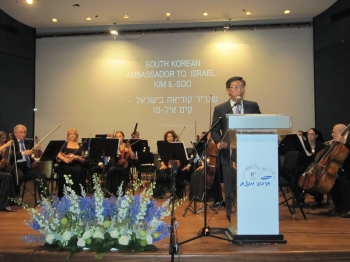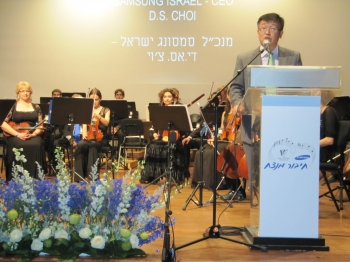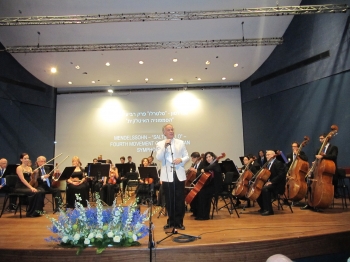Every language has marvelous twists and turns and special word-plays that just do not translate into other tongues. Hebrew is no exception. So I will not even try to explain the Hebrew title of the concert at the Recanati Auditorium of the Tel Aviv Museum of Art on Wednesday evening, except to say that in Hebrew, it is brilliant. (In English it simply translates as “A Winning Combination”.)
Brilliant too was the performance by the Israel Chamber Orchestra, conducted as usual by Maestro Yoav Talmi. The entire evening was generously supported by the Samsung Electronics Group, based in Korea.
The Israeli Samsung representative Mr. Choi Dong Seok addressed the audience. “Music is a priceless form of expression, and it plays an important role in shaping society, balancing our lives with a wide spectrum of emotions”, he said. His Excellency the ambassador to Israel of South Korea, Mr. Kim Il-Soo, graced the evening with his presence and graciously addressed the audience briefly as well. He mentioned how pleased and surprised he is time and again to discover how appreciative Israeli audiences are of music, including classical music. To judge by the lengthy applause during and at the end of the concert, his Excellency had another opportunity to experience the warm gratitude of the audience for the outstanding concert.
The concert opened with a rendition of the overture from “The Barber of Seville”. Other musical selections for the evening included a selection of Romanian folk dances by Bartok, the 2nd and 3rd movements from Vivaldi’s “The Four Seasons” (Summer), the 4th movement from Mendelssohn’s “Saltarello” and surprisingly, the American Aaron Copland’s “Hoe-Down” from “Rodeo”.
But by far the most exciting was Haydn’s 4th movement from “The Farewell Symphony” – as lovely today as when it was written in 1772. It was written for Haydn's patron, Prince Nikolaus Esterházy, while he, Haydn and the court orchestra were at the Prince's summer palace in Eszterháza. The stay there had been longer than expected, and most of the musicians had been forced to leave their wives back at home in Eisenstadt, so in the last movement of the symphony, Haydn subtly hinted to his patron that perhaps he might like to allow the musicians to return home: during the final adagio each musician stops playing, snuffs out the candle on his music stand, and leaves in turn, so that at the end, there are just two muted violins left (played by Haydn himself and the concertmaster, Alois Luigi Tomasini). Esterházy seems to have understood the message: the court returned to Eisenstadt the day following the performance. At the concert in Tel Aviv the ritual was repeated, with musicians leaving the stage until just two remained on the darkened podium. Dramatic and beautiful.
Maestro Talmi thanked the hosts (Samsung) for their generous support and thanked the musicians – and the audience – for their musical skills and their appreciation, respectively. He reminded the audience that the Israel Chamber Orchestra has a varied program to suit all tastes (“… but don’t expect hard rock…,” he added with a smile).
This concert was another fine example.
Photos Silvia G.Golan













